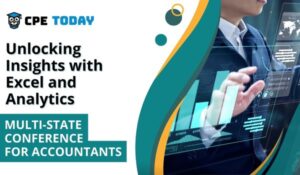
Major Topics
Learning Objectives
- Identify types of income, from a financial and tax perspective, to be budgeted into cash so that income-producing assets can be acquired and managed for an effective investment plan.
- Determine compensation to maximize the net dollar return using strategies that involve all aspects of how the client relates to the company for which they may be an owner, employee, or both.
- Specify the differences between qualified deferred compensation plans and nonqualified deferred compensation plans, and recognize defined contribution plans from defined benefit plans identifying the characteristics of each so that business owners may choose the most suitable plan to accomplish their financial and worker incentive objectives.
- Recognize the scope and variety of excluded fringe benefits including tax treatment, operational details, and level of incentive-based compensation.
- Identify the disallowance of entertainment expenses, determine the tax treatment of reimbursements paid under accountable and unaccountable plans, and recognize deductible travel expenses undertaken for business.
- Specify types of insurance that a company can provide its employees, define the various types of equity participation available from which companies may choose, and identify the basic types of buy-sell agreements.
Course Description
This mini-course examines the various ideas, methods, and techniques capable of optimizing the overall compensation package for key employees and principals in small to medium-sized businesses. Qualified and non-qualified deferred compensation, benefit targeting, insurance programs, statutory fringe benefits, interest-free loans, and investment planning are investigated. Consideration is given to indirect compensation in the form of business entertainment, expense accounts, auto use, travel, and transportation. The new field of professional services is probed to provide tax, financial, and estate planning to the key executive.
Compliance Information
Advanced Preparation
None
Field of Study
Taxes
Credits
3 Credits
Published Date
April 18, 2023
Revision Date
February 14, 2024Course Authors
Danny Santucci
Danny earned his Bachelor of Arts in Political Science from the University of California at Irvine in 1969. He received his Juris Doctorate from Boalt Hall School of Law, University of California at Berkeley in 1972, at which time he began practice as a tax attorney in Southern California. His legal career started with the business and litigation firm of Edwards, Edwards, and Ashton. Later he joined the Century City entertainment firm of Bushkin, Gaims, Gaines & Jonas working for many well-known celebrities. In 1980, Danny established the law firm of Santucci, Potter, and Leanders, in Irvine, California. With increasing lecture and writing commitments, Danny went into sole practice in 1995. His practice emphasizes business taxation, real estate law, and estate planning.
Overview
This mini-course examines the various ideas, methods, and techniques capable of optimizing the overall compensation package for key employees and principals in small to medium-sized businesses. Qualified and non-qualified deferred compensation, benefit targeting, insurance programs, statutory fringe benefits, interest-free loans, and investment planning are investigated. Consideration is given to indirect compensation in the form of business entertainment, expense accounts, auto use, travel, and transportation. The new field of professional services is probed to provide tax, financial, and estate planning to the key executive.
Course Details
- Identify types of income, from a financial and tax perspective, to be budgeted into cash so that income-producing assets can be acquired and managed for an effective investment plan.
- Determine compensation to maximize the net dollar return using strategies that involve all aspects of how the client relates to the company for which they may be an owner, employee, or both.
- Specify the differences between qualified deferred compensation plans and nonqualified deferred compensation plans, and recognize defined contribution plans from defined benefit plans identifying the characteristics of each so that business owners may choose the most suitable plan to accomplish their financial and worker incentive objectives.
- Recognize the scope and variety of excluded fringe benefits including tax treatment, operational details, and level of incentive-based compensation.
- Identify the disallowance of entertainment expenses, determine the tax treatment of reimbursements paid under accountable and unaccountable plans, and recognize deductible travel expenses undertaken for business.
- Specify types of insurance that a company can provide its employees, define the various types of equity participation available from which companies may choose, and identify the basic types of buy-sell agreements.
Intended Audience —
Advanced Preparation — None
Field of Study — Taxes
Credits — 3 Credits
IRS Program Number –
Published Date – April 18, 2023
Revision Date – February 14, 2024
Course Authors
Danny Santucci
Danny earned his Bachelor of Arts in Political Science from the University of California at Irvine in 1969. He received his Juris Doctorate from Boalt Hall School of Law, University of California at Berkeley in 1972, at which time he began practice as a tax attorney in Southern California. His legal career started with the business and litigation firm of Edwards, Edwards, and Ashton. Later he joined the Century City entertainment firm of Bushkin, Gaims, Gaines & Jonas working for many well-known celebrities. In 1980, Danny established the law firm of Santucci, Potter, and Leanders, in Irvine, California. With increasing lecture and writing commitments, Danny went into sole practice in 1995. His practice emphasizes business taxation, real estate law, and estate planning.
All of our self-study courses are NASBA approved (through our partners at K2 Enterprises) the revisions to the Statement on Standards for Continuing Professional Education (CPE) Programs (Standards).
Your Registration Includes:
- ✓ Course materials (video & PDF version)
- ✓ Unlimited attempts to complete exam
- ✓ Course materials (PDF & Sample Materials)
- ✓ Instant grading & certificate of completion
- ✓ One year access to complete your CPE
- ✓ Completion certificate



